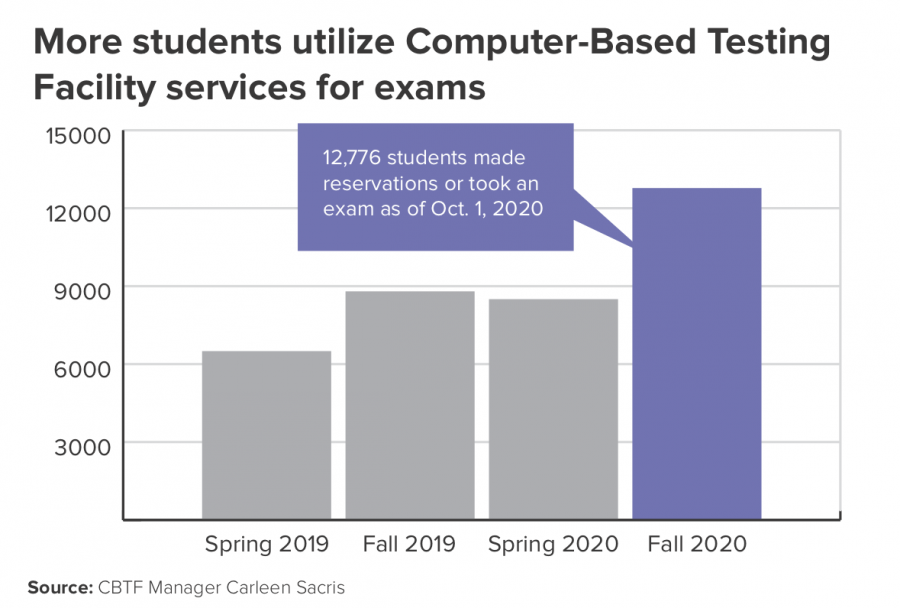Overflow of online exams leaves University searching for proctors
Oct 8, 2020
As many courses have shifted online amid the ongoing COVID-19 pandemic, there has been a sudden emphasis on virtual proctoring.
As such, the Computer-Based Testing Facility (CBTF) has been forced into the limelight, as it handles all traffic that goes into the auto-grader and now proctors nearly 6,000 exams per week this semester, CBTF Manager Carleen Sacris said.
This semester, 150 classes are using the CBTF, about four times more classes than the Fall 2019 semester, and three and a half times last semester’s total.
The CBTF isn’t handling any in-person exams this semester due to the reduced capacity as a result of safety and health guidelines. CBTF Online uses human proctoring via Zoom for exams on PrairieLearn, Gradescope and other similar platforms.
Students make reservations for their exams through the CBTF Scheduler, check in a few minutes before the exam and use the Zoom link provided on a separate device, which acts as a document camera, monitoring their workspace.
Get The Daily Illini in your inbox!
The students’s behavior during exams is monitored, and any “suspicious behavior” that may indicate cheating is followed up on.
“If we determine that something is suspicious, we usually take a few exam days to observe the students,” Sacris said. “So, once we note that something is not quite right, then we note it down and then we follow the students over the course of the semester to see if it really is intentional or if there is something malicious about it.”
Clear violations, like a student’s notes being visible on-screen while he or she is taking a test, are dealt with through the process specified in the student code in the Faculty Academic Integrity Report.
As of Oct. 1, 12,776 University students had registered for an online exam. More staff is being hired and trained to keep up with the demand for proctors, Sacris says.
“My usual average staff is about 30 proctors, and now we’re trying to hire about 80 proctors,” Sacris said.
Apart from supervising the exams and ensuring no unfair means are being used by students, proctors have also had to deal with technological issues, including when students are unable to join the Zoom meeting or if their connection gets cut off mid-exam.
“Those are the sort of things that we are trying to support the students in,” Sacris said. “We’re just not as quick to jump to conclusions, because if they say that, ‘well, I have an internet connection problem,’ there’s really no way for us to not believe them, we have to give them the benefit of the doubt.”
Students have been excused in the case there has been a roommate in the background to accommodate students who have to stay in their dorms due to COVID-19 regulations, as long as they weren’t conversing with each other.
To better educate students about the system, the CBTF website has articles and pictures depicting how to position the camera to properly show the workspace. Step-by-step instructions are also given to sign in to Zoom using the Single Sign-On (SSO).
“We also have office hours that are really designed for them to go in, practice their camera angle, ask proctors any questions that they have and get settled in the logistics of taking the exam,” Sacris said. “We even encourage students who have not given an exam yet to try to join the Zoom call from their phone for practice.”
Students who receive help through Disability Resources and Education Services are also given time extensions and are recommended to be seated in an area with minimum distractions to accommodate their needs.
“We are here for the students,” Sacris said. “We are very deliberate in our hiring (of proctors) and are open to any feedback.”






